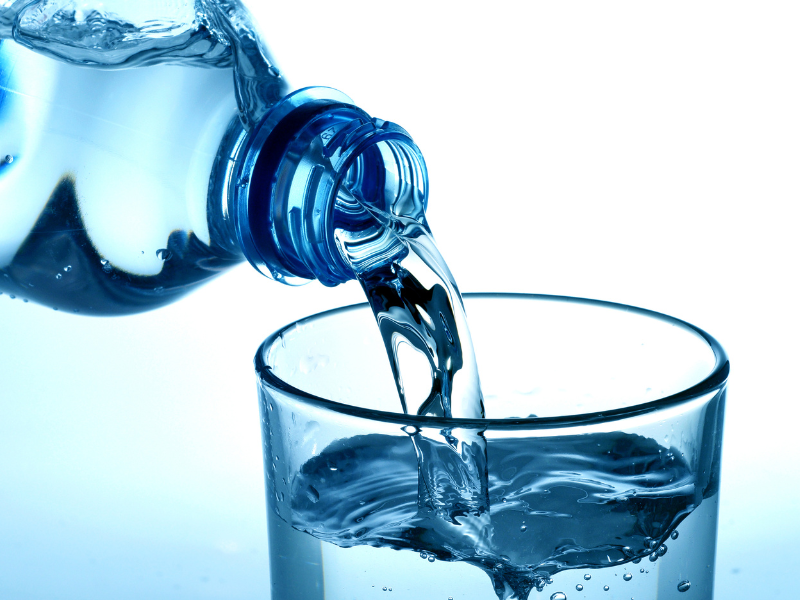


Fasting has become an increasingly popular strategy for those seeking rapid weight loss, with the 3-day water fast emerging as one of the most talked-about methods. So the question of “how much weight will I lose on a 3-day water fast” has become pretty common. This approach involves completely abstaining from food for 72 hours, and consuming only water.
While a 3-day water fast can lead to noticeable weight loss in a short amount of time, it’s crucial to understand that this weight loss primarily comes from water and muscle mass rather than excess fat. Our article will break down the potential benefits of this form of fasting as well as the risks it may pose to your body. Read on to find out more!
What is a Water Fast?

As the name suggests, water fast is the act of abstaining from all food and beverages, except for water, for a set period, typically ranging from 24 to 72 hours [1]. During this time, individuals are typically advised to drink between 2 to 3 litres of water, especially mineralised water, every day [2].
The goal of water fasting is to give your body a break from digesting food, reduce calorie consumption, while avoiding strenuous exercise during the fast. People may fast for reasons such as weight loss, detoxification, religious practices, or preparing for medical procedures.
Can I Lose Weight on the 3-Day Water Fast?

Yes, you can lose weight during a 3-day water fast. There’s no exact answer as to how much weight one can typically lose, as it depends on your starting weight, metabolism, overall health conditions and gender. On average, you can expect to lose 1-2 lbs per day over the course of 72 hours [3].
While the scale may show a lower number immediately after the fast, these are expected short-term effects. This is because much of the weight loss comes from water weight, glycogen depletion, and a higher proportion muscle mass loss, rather than fat loss [4].
In the early stages of fasting, the body taps into water-laden glycogen stores (a form of glucose stored in muscles and the liver) for energy. Water is released upon glycogen depletion, leading to a temporary reduction in weight [5].
Furthermore, while some fat loss may occur, it is minimal compared to longer fasts or consistent lifestyle changes. Once glycogen is depleted, the body begins to burn fat for energy, and this typically requires a longer term weight loss diet.
Benefits of the 3-Day Water Fast

Although scientific research on the benefits of water fasting in humans is still limited, there are a few potential health advantages, including:
- Inducing autophagy: During a water fast, the body enters a process called autophagy,a process through which the body breaks down and recycles damaged or outdated cell components, helping cells function more efficiently. This natural “cleaning” process is triggered when cells experience stress or a lack of nutrients. Research suggests that fasting and calorie restriction can induce nutrient scarcity, prompting the body to repurpose cellular components to maintain proper function [6].
- Lowering blood sugar levels: Water fasting can improve insulin sensitivity. When your cells are more responsive to insulin, they are better able to absorb glucose from the bloodstream, resulting in lower blood sugar levels. Furthermore, the limited glucose intake from food causes a direct decrease in blood sugar levels. This can lower the risk of type 2 diabetes and help stabilise blood sugar levels.
- Reduced risk of heart disease: Prolonged water fasting is often linked to lower blood pressure, both systolic and diastolic, which can help reduce the risk of cardiovascular diseases. Water fasting may improve lipid levels, lowering total cholesterol, LDL (“bad”) cholesterol, and triglycerides, potentially reducing the risk of atherosclerosis and heart disease [7].
Drawbacks of the Water Fasting Period

While water fasting offers several benefits, there are also risks to be aware of:
- Dehydration: Fasting for extended periods can lead to nutrient deficiencies and dehydration. Even though you’re drinking water, fasting still carries the risk of dehydration because we normally get about 20-30% of our daily water intake from food [8].
- Electrolyte Imbalance: An electrolyte imbalance occurs when there is an abnormal level of electrolytes in your body, either too much or too little. Fasting for more than 12 hours can result in an electrolyte deficiency, since the majority of our electrolytes come from food.
- Malnutrition: Prolonged fasting can lead to malnutrition, especially if you don’t receive essential nutrients during the refeeding period. Malnutrition can result in digestive issues, sudden hair loss, dry skin, reduced bone health, and mild cognitive decline [9].
- Orthostatic Hypotension: A drop in blood pressure when standing up suddenly can cause dizziness or fainting.
- Muscle Loss: Extended water fasting may result in muscle loss, particularly if protein intake is insufficient during the refeeding phase. Muscle loss would lower your basal metabolic rate, making it more difficult to pursue a longer term weight loss plan.
Discover intermittent fasting:
Intermittent Fasting During Menopause: Everything You Need to Know
Intermittent Fasting by Age Chart: A Guide on How it Works
Who is the 3-Day Water Fast Not Recommended For?

While many people may safely attempt a 3-day water fast, it is not suitable for everyone. It is particularly unsafe for:
- People with diabetes, especially type 1 diabetes, should avoid fasting without medical supervision, as they rely on insulin to manage their blood sugar levels. Fasting can lead to dangerous fluctuations in blood sugar, so it’s important to consult with a healthcare provider before attempting any type of fast to ensure safety.
- Pregnant or breastfeeding women should refrain from fasting, as their bodies require extra nutrients to support both their own health and the development of their baby. Fasting during this time can deprive the body of essential vitamins and minerals, potentially harming both mother and child.
- Individuals who are ill, taking medications, or experiencing severe migraines should also be cautious, as fasting could worsen medical conditions or interact negatively with prescribed treatments. It’s crucial to consult with a doctor to understand the potential risks before starting a fast.
- People with heart conditions should be cautious when fasting, as it can place additional stress on the cardiovascular system. They should consult a healthcare professional to avoid exacerbating their condition.
- Those with eating disorders, since fasting could trigger harmful behaviors, especially among young adults.
Learn more about diet strategy safety:
How to lose 15 pounds in 2 weeks: Is It Possible and Safe?
A Guide on How To Lose 5 Pounds in a Week
Conclusion

A 3-day water fast can lead to weight loss, primarily through the loss of water weight and glycogen depletion, rather than fat loss. While it may offer health benefits such as cellular repair, metabolic reset, and improved insulin sensitivity. However, these benefits of this 3-day fast are usually short-lived, with key markers often returning to baseline levels once participants begin eating again after the fast.
Furthermore, it also carries risks such as malnutrition, dehydration, and muscle loss. Before starting any fasting regimen, it’s essential to consult a healthcare provider, as sustainable weight loss is best achieved through long-term healthy habits like a balanced diet and regular exercise. For more helpful tips on exercise and health, check out the JustFit app!
Will I lose belly fat if I fast for 3 days?
How often should I do a 3-day fast for weight loss?
Is 3 days enough to lose weight?
6 signs of nutrient deficiency. RUSH. (n.d.). Available at: https://www.rush.edu/news/6-signs-nutrient-deficiency Capritto, A. (2024, May 20). Should you try water fasting?. Verywell Fit. Available at: https://www.verywellfit.com/is-water-fasting-safe-4588873 Cleveland Clinic. (2024b, September 5). Fasting: How does it affect your heart and blood pressure?. Cleveland Clinic. Available at: https://health.clevelandclinic.org/fasting-how-does-it-affect-your-heart-and-blood-pressure Golnaz. (2024, November 6). How much weight will I lose on a 3 day water fast?: Shocking results!. elegant hoopoe. Available at: https://eleganthoopoe.ae/blog/how-much-weight-will-i-lose-on-a-3-day-water-fast/ Guelinckx, I., Tavoularis, G., König, J., Morin, C., Gharbi, H., & Gandy, J. (2016). Contribution of Water from Food and Fluids to Total Water Intake: Analysis of a French and UK Population Surveys. Nutrients, 8(10), 630. Available at: https://doi.org/10.3390/nu8100630 Samuels, M. (n.d.). Glycogen and weight loss | livestrong. LIVESTRONG.COM. Available at: https://www.livestrong.com/article/307905-glycogen-and-weight-loss/ Sissons, C. (2018, October 18). Water fasting: Benefits, risks, and how to do it. Medical News Today. Available at: https://www.medicalnewstoday.com/articles/319835#how-it-works





